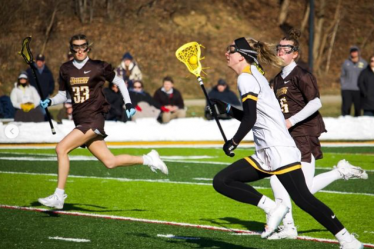Anna Duke
At the end of September, Michael Phelps, the most decorated Olympian in history, was arrested on the charge of driving under the influence. As the media and the swimming world debate whether or not the consequences for his second offense in 10 years are fair, I have been reading the articles unphased. The former “role model” has finally made another mistake, but this time big enough for the public to question his reputation in society.
I was a competitive swimmer for 15 years, and I competed during what many would call the Michael Phelps era. The sport of swimming was becoming more popular than it had been in years thanks to the Maryland swimmer. At the age of 17, Phelps became a stand-out swimmer on the world stage after setting a world record and winning 11 medals at the Pan Pacific and World Championships. Two years later, he made the Olympics and took home six gold medals and two bronze — a feat that had only been achieved once before by swimmer Mark Spitz.
The publicity about Phelps and his swimming accomplishments increased the number of children who were enrolled in swim programs around the world. Even younger swimmers on the Olympic scene, like Olympic medalists Missy Franklin and Katie Ledecky, attribute their interest in the sport to Michael Phelps.
Unlike these swimmers, I have completely disregarded Phelps as a role model for the sport. My distaste for the Olympian started a year after his DUI charges in 2004 when I met him in person.
When I was in middle school and aspiring to be an amazing swimmer, I attended the University of Michigan Swim Camp where Phelps was training with Bob Bowman. If Phelps were to practice while anyone at swim camp was in the natatorium, the swim staff would turn off all of the lights in the pool so we couldn’t see Phelps come on the deck. When the lights went back on, Phelps was in the water, mixed in a sea of swimming arms.
Later in the week, we all stood in line to get signatures from Olympians. When giving out autographs, it was obvious that he was not enthused to be there. I am sure he gave thousands of autographs that year, but there were 120 swimmers that all wanted to be like him lined up that day. It seemed like he couldn’t care less. Instead of looking up to him, I looked to lower profile swimmers like Matt Grevers, Rebecca Soni and Christine Magnuson who were grateful to have fans.
On top of my personal experience, other situations Phelps has been in have proven my middle school judgment right. Phelps has dutifully fulfilled the dumb athlete stereotype and broken the law repeatedly.
Almost anyone who listens to an interview with the Olympian can tell that he is not the smartest. Watching Phelps speak at press conferences or after his races is painful. The statements on how he feels about his swims or accomplishments are so emotionless and boring that I am tempted to mute the TV. When he was close to breaking Spitz’s Olympic medal record, he was interviewed about Spitz’s records. Phelps admitted he didn’t even know who the man was until his coach, Bob Bowman, told him.
The swimmer has not had a spotless past either. He has been in the media three times now for drug and alcohol infractions. First, a DUI in 2004 when he was only 19. Then in 2009 when he was 23, he went and visited a girl at the University of South Carolina and was caught on camera taking a hit from a water bong.
While I do think there is a fine line between public and personal life that the media sometimes crosses, I think that if Phelps is considered to be a role model, he should be somewhat put together in all parts of his life. I understand that young athletes make mistakes, and I am tolerant of that. However, Phelps has made too many mistakes for me to view him as a role model. At this point, his impressive achievements should be taken at face value instead of people looking up to him.

